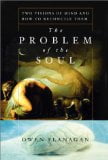 The Problem of the Soul: Two Visions of Mind and How to Reconcile Them
The Problem of the Soul: Two Visions of Mind and How to Reconcile Them
by Owen Flanagan
Basic Books, $16.95, ISBN 0465024610
This philosophical report on where the soul stands, in the light of scientific research, will not be an altogether happy read for those who would prefer to cling on to their souls, perhaps in the hope of some kind of eternal harp recital, or the company of subservient virgins.
For such people, including, apparently, 60% of scientists, the news is of course grim. As Flanagan says in his preface, “Supernatural concepts have no philosophical warrant… There are simply no good arguments – theological, philosophical, humanistic, or scientific – for beliefs in divine beings, miracles, or heavenly afterlives.” He explains and defends the position of physicalism, the view that all mental events are, ultimately, brain events. This idea has moved from being a hypothesis to being “a constitutive truth in mind science.”
Given that the brain is a natural object, a corollary would seem to be that what the brain does is subject to causal regularities. However, given the immense complexity of neural processes and personal history, we are nowhere near able to provide a comprehensive causal account of someone’s decision-making. So it may seem that one of the constitutive elements of the soul – free will – may be safe from scientific abolition.
Flanagan espouses neo-compatibilism, the view that rational choice is compatible with causation, and explains how we must disentangle explanation from prediction, how we shouldn’t get too excited by free-will arguments based on indeterminacy (who wants free will to be the result of random causation?) and how we may retain much that we value in our image of our own species. He offers a naturalistic account of the self, and concludes with a view of ethics as a kind of human ecology, an empirical field.
Skeptical readers may find this a useful source of arguments and ideas for making sense of a soul-free universe, and, given that the often chatty tone is somewhat less belligerent than Daniel Dennett’s, the book could also be a suggested read for believers.
Paul Taylor



